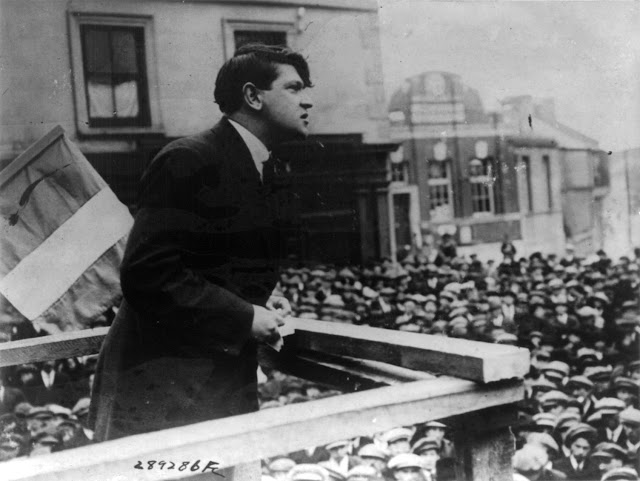Éamon de Valera refused to recognize the events of the prior week and declared that the Republic of Ireland had not been disestablished.
Of course, it was debatable if the Irish had actually called the Republic into being in the first place, although that argument could be legally made on the basis that they voted, except for those in Ulster, for parliamentarians who chose to separately assemble, an interesting, and brilliant, approach by Irish Republicans. Now, however, those same parliamentarians in the same body had voted to accept the treaty, something De Valera had regarded as legitimate right up until. . . this day.
His walking out didn't stop Dubliners from rejoicing at the approval of the treaty. That this would result in a civil war, while feared, was not yet fully appreciated.
Of local interest, the Casper Herald was reporting that the city's merchants were losing $1,000,000 a year in local sales to mail orders, showing how long that complaint has existed.
Col. Charlies Young, whom we've written about here before, died in Lagos, Nigeria as a result of a stroke while serving as the US military attaché in Liberia.
Young's death was somewhat ironic in that he was an outwardly vigorous man whose excellent military service should have placed him in position for a senior leadership in the Army during the Great War. He was instead involuntarily retired on the pretext of ill health, with the service citing high blood pressure, which he then challenged by riding from his home in Ohio to Washington, D. C. by horseback.
The fear had been that if Young was allowed to command during World War One, he would have white officers under him as he'd be eligible for promotion to Brigadier General. In fact, he'd already commanded a mix race command in the field during the Punitive Expedition as a result of a battlefield event without incident.
His long ride had led to his reinstatement in the Army, but as a military attaché. His death on an expedition to British Nigeria ended up ironically proving the point of his forced retirement, even though it had been a pretext. He was 57 at the time of his death.
It would take a year for his body to be returned to the United States due to a British legal requirement that those dying in Nigeria be buried there.
An election was held in Polish puppet state Central Lithuania, in which a majority of voters cast ballots to remain part of Poland. About half of the tiny entities' territory was occupied by Poles or had a population of Poles. The putative state included Vilnius.


















































